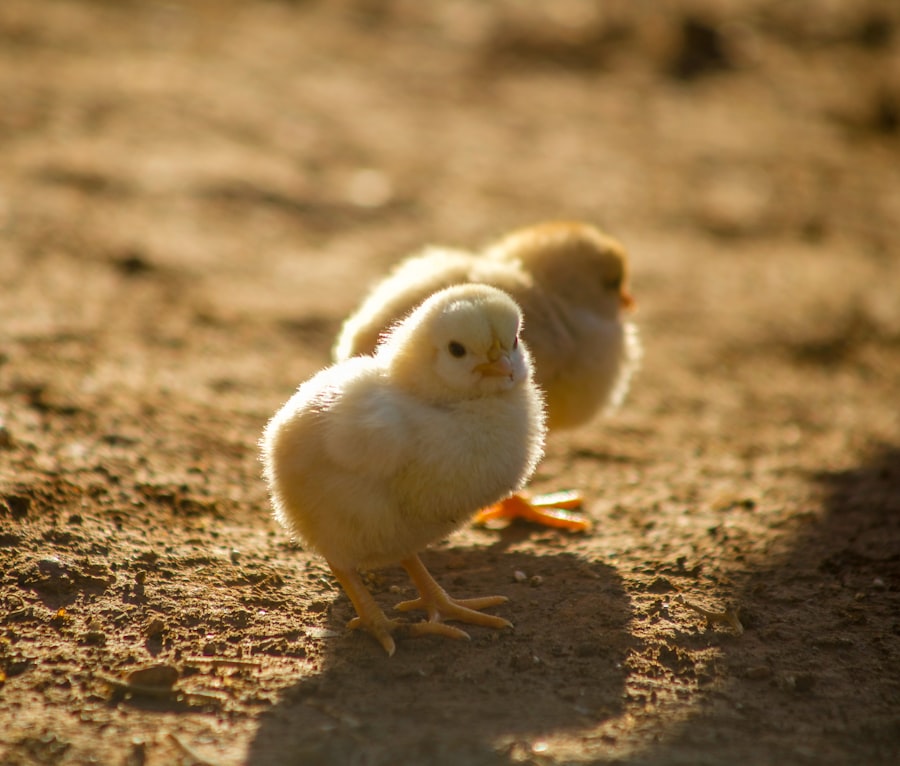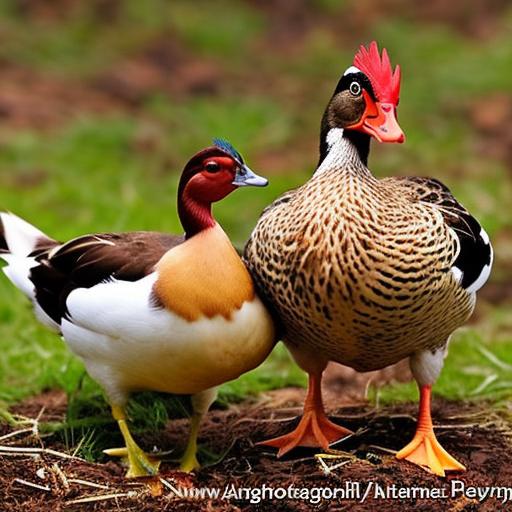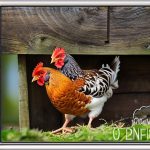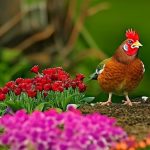Keeping chickens and ducks together is a popular trend in backyard poultry farming. Many people are discovering the benefits of raising these two species together, as they can coexist harmoniously and provide a variety of advantages for both the birds and the owner. In this article, we will explore the compatibility of chickens and ducks, the benefits of keeping them together, factors to consider before introducing them, how to build a coop suitable for both species, feeding considerations, health concerns, and tips for managing flock dynamics. By the end of this article, you will have a comprehensive understanding of keeping chickens and ducks together and be equipped with the knowledge to embark on your own backyard poultry farming journey.
Key Takeaways
- Chickens and ducks can be compatible and kept together in the same coop.
- Keeping chickens and ducks together can provide benefits such as pest control and increased egg production.
- Factors to consider before keeping chickens and ducks together include breed compatibility and space requirements.
- When building a coop for chickens and ducks, it is important to consider their different needs and behaviors.
- Managing flock dynamics and monitoring for health concerns are important when keeping chickens and ducks together.
Understanding the Compatibility of Chickens and Ducks
Chickens and ducks have a natural relationship that can be quite complementary. Chickens are known for their scratching behavior, which helps to aerate the soil and control pests. Ducks, on the other hand, are excellent foragers and are particularly skilled at eating slugs, snails, and other garden pests. By keeping chickens and ducks together, you can create a dynamic ecosystem in your backyard where each species contributes to the overall health and balance.
However, it is important to note that chickens and ducks have different behaviors and needs. Chickens are ground-dwelling birds that prefer to roost in trees or on elevated perches at night. They also require dust baths to keep their feathers clean and healthy. Ducks, on the other hand, are waterfowl that enjoy swimming and need access to water for bathing and foraging. They also have different dietary requirements compared to chickens. Understanding these differences is crucial when considering keeping chickens and ducks together.
Benefits of Keeping Chickens and Ducks Together
There are several advantages to keeping chickens and ducks together. Firstly, they can help each other with pest control. Chickens will eat insects on the ground while ducks will consume pests in the water. This can significantly reduce the need for chemical pesticides in your backyard. Additionally, ducks produce a large amount of manure, which can be beneficial for fertilizing your garden. Chickens, on the other hand, are excellent at turning over soil and spreading the manure evenly.
Keeping chickens and ducks together can also provide entertainment and companionship. Both species are social animals and enjoy the company of others. They will often interact with each other, which can be quite entertaining to watch. Furthermore, having a diverse flock can provide a more interesting and visually appealing backyard environment.
Factors to Consider Before Keeping Chickens and Ducks Together
Before introducing chickens and ducks, there are several important factors to consider. Firstly, you need to ensure that you have enough space to accommodate both species. Chickens require at least 4 square feet of space per bird in the coop, while ducks need a minimum of 10 square feet per bird. It is important to provide enough space for both species to move around comfortably.
Another factor to consider is breed compatibility. Some chicken breeds may be more aggressive towards ducks, while others may be more tolerant. It is important to choose chicken breeds that are known to be docile and friendly towards other species. Similarly, certain duck breeds may be more compatible with chickens than others. Researching breed characteristics and consulting with experienced poultry keepers can help you make informed decisions.
Other considerations include predator protection, access to water, and climate suitability. Chickens and ducks are both vulnerable to predators such as raccoons, foxes, and hawks. It is important to have secure fencing and adequate shelter to protect them from these threats. Ducks also require access to water for swimming and bathing, so having a pond or a shallow pool is essential. Lastly, consider the climate in your area and whether it is suitable for both chickens and ducks.
Building a Coop for Chickens and Ducks
A well-designed coop is essential for keeping chickens and ducks together. It provides shelter, protection from predators, and a comfortable living space for the birds. When building a coop, there are several basic requirements to consider.
Firstly, the coop should be spacious enough to accommodate both chickens and ducks comfortably. As mentioned earlier, chickens require at least 4 square feet of space per bird, while ducks need a minimum of 10 square feet per bird. It is important to provide enough room for them to move around freely.
The coop should also have adequate ventilation to ensure good air circulation. This helps to prevent the buildup of moisture and ammonia, which can lead to respiratory issues in the birds. Windows or vents can be installed to allow fresh air to enter the coop.
Additionally, the coop should have nesting boxes for the chickens to lay their eggs. These boxes should be elevated off the ground and filled with clean bedding material such as straw or wood shavings. Ducks, on the other hand, do not require nesting boxes as they prefer to lay their eggs in hidden spots on the ground.
Designing the Coop for Chickens and Ducks

When designing a coop for chickens and ducks, there are several important features to include. Firstly, it is beneficial to have separate areas for chickens and ducks within the coop. This allows each species to have their own space and reduces the risk of aggression or territorial disputes.
For chickens, it is important to provide roosting bars or perches for them to sleep on at night. These should be elevated off the ground and wide enough for the chickens to comfortably perch on. Ducks, on the other hand, do not require perches as they prefer to sleep on the ground.
Another important feature is a water source for the ducks. This can be a shallow pool or a small pond within or adjacent to the coop. Ducks need access to water for swimming, bathing, and foraging. It is important to ensure that the water source is clean and regularly maintained.
Lastly, consider the flooring material in the coop. Chickens and ducks both produce a significant amount of manure, so it is important to choose a flooring material that is easy to clean and maintain. Concrete or vinyl flooring can be a good option as they are durable and can be easily hosed down or swept clean.
Feeding Chickens and Ducks Together
Feeding chickens and ducks together requires some consideration due to their different dietary needs. Chickens are omnivores and require a balanced diet of grains, protein, fruits, vegetables, and insects. They can be fed a commercial chicken feed supplemented with kitchen scraps and foraged insects.
Ducks, on the other hand, are primarily herbivores and require a diet that is higher in protein. They can be fed a commercial duck feed supplemented with fresh greens, vegetables, and insects. It is important to choose a feed that is specifically formulated for ducks as it will meet their nutritional requirements.
When feeding chickens and ducks together, it is important to ensure that each species has access to their specific feed. This can be achieved by using separate feeding stations or by feeding them at different times of the day. It is also important to provide fresh water for both species at all times.
Health Concerns When Keeping Chickens and Ducks Together
Keeping chickens and ducks together can pose some health risks if proper precautions are not taken. One of the main concerns is the transmission of diseases between the two species. Chickens are susceptible to certain diseases such as coccidiosis and Marek’s disease, while ducks can carry diseases such as duck viral enteritis and botulism.
To prevent the spread of diseases, it is important to practice good biosecurity measures. This includes regularly cleaning and disinfecting the coop, providing clean bedding material, and separating sick or injured birds from the rest of the flock. It is also important to monitor the health of the birds closely and seek veterinary care if any signs of illness are observed.
Another health concern is the risk of parasites such as mites and lice. These pests can infest both chickens and ducks and cause discomfort and health issues. Regularly inspecting the birds for signs of parasites and treating them promptly can help prevent infestations.
Managing Flock Dynamics in a Coop with Chickens and Ducks
Managing flock dynamics is crucial when keeping chickens and ducks together. Both species have their own social hierarchy and it is important to ensure that there is no aggression or bullying within the flock.
One way to manage flock dynamics is by providing enough space for each bird. Overcrowding can lead to stress and aggression, so it is important to provide adequate space for both chickens and ducks to move around comfortably.
Another strategy is to introduce new birds gradually. When introducing new chickens or ducks to an existing flock, it is important to do so slowly and in a controlled manner. This allows the birds to establish a pecking order without causing excessive stress or aggression.
Additionally, providing multiple feeding stations and water sources can help reduce competition and prevent bullying. This ensures that each bird has access to food and water without having to compete with others.
Conclusion and Final Thoughts on Keeping Chickens and Ducks Together
In conclusion, keeping chickens and ducks together can be a rewarding experience for backyard poultry farmers. The natural relationship between these two species allows them to coexist harmoniously and provide a variety of benefits. By understanding their compatibility, considering important factors, building a suitable coop, providing proper nutrition, managing health concerns, and maintaining flock dynamics, you can create a thriving ecosystem in your backyard.
If you are considering backyard poultry farming, keeping chickens and ducks together is definitely worth considering. Not only will you enjoy the entertainment and companionship they provide, but you will also benefit from their pest control abilities and the fertilization of your garden. With proper planning and care, you can create a sustainable and enjoyable environment for both chickens and ducks. So why not give it a try and embark on your own backyard poultry farming journey?
If you’re considering keeping chickens and ducks together, it’s important to understand the best practices for creating a suitable living environment for both species. One helpful resource is an article on Poultry Wizard’s website that provides insights into building an A-frame chicken coop. This article offers valuable tips on constructing a coop that can accommodate both chickens and ducks comfortably. To learn more about this topic, check out the article here. Additionally, Poultry Wizard also offers articles on other aspects of chicken keeping, such as the flooring options for chicken coops (link) and ideas for large chicken coops (link).
FAQs
Can I keep chickens and ducks together?
Yes, it is possible to keep chickens and ducks together in the same coop and run. However, there are some important considerations to keep in mind before doing so.
What are the benefits of keeping chickens and ducks together?
Keeping chickens and ducks together can provide several benefits, such as increased egg production, pest control, and entertainment. Chickens and ducks have different foraging habits, which means they can help keep the coop and run clean by eating different types of insects and vegetation.
What are the challenges of keeping chickens and ducks together?
One of the main challenges of keeping chickens and ducks together is that they have different dietary needs. Chickens require a higher protein diet than ducks, which means they may not thrive if they are fed the same food as ducks. Additionally, ducks produce more water waste than chickens, which can make the coop and run wet and muddy.
What should I consider before keeping chickens and ducks together?
Before keeping chickens and ducks together, you should consider the size of your coop and run, the number of birds you plan to keep, and their dietary needs. You should also make sure that the coop and run are secure and predator-proof, as both chickens and ducks are vulnerable to predators.
How can I ensure that my chickens and ducks get along?
To ensure that your chickens and ducks get along, you should introduce them gradually and provide plenty of space for them to move around. You should also provide separate feeding and watering stations for each species, and make sure that there are enough resources for all of the birds. Additionally, you should monitor the birds closely for any signs of aggression or bullying.
Meet Walter, the feathered-friend fanatic of Florida! Nestled in the sunshine state, Walter struts through life with his feathered companions, clucking his way to happiness. With a coop that’s fancier than a five-star hotel, he’s the Don Juan of the chicken world. When he’s not teaching his hens to do the cha-cha, you’ll find him in a heated debate with his prized rooster, Sir Clucks-a-Lot. Walter’s poultry passion is no yolk; he’s the sunny-side-up guy you never knew you needed in your flock of friends!







